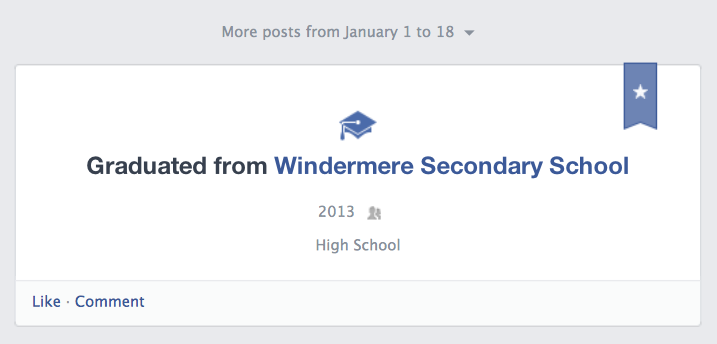Our discussion in ASTU class today got me thinking a lot more about the Internet and how the online platform is practically in a world of its own. It is shaped by the stakeholders that control it (such as Google, Facebook, Firefox, etc.), and it’s users, who are the ones responsible for bringing it to life.
Consumers are prompted (and to some extent, feel obligated) to share a wide range of personal information on the networking sites they are in. For example, take a look at the “Timeline” on Facebook. I think when I first discovered it, I thought of something along the lines of, “wow, this is going to make creeping a whole lot easier.” Now whether we like to admit this or not, the fact is that this is the purpose of social networking sites. They were built with the intention of creating common grounds in the online world for people to connect, and learn more about the people they are connected to. It’s funny, because despite all this, I still find myself wanting to maintain a degree of privacy on Facebook, and I’ve opted to leave a majority of my “about” and “life events” section on my profile relatively blank.
It wasn’t until our discussion in class today, was I reminded of a small, yet profound incident. At the beginning of the year, I noticed something that builds upon Eli Pariser’s Ted talk, Beware online “filter bubbles.” There, he talks about how major stakeholders have an increasing amount of control in personalizing the internet for its users. Have a look:
On the very first day of the new year, Facebook automatically published and highlighted a “life event” on my profile, because apparently, I graduated from high school six months early. I found myself confused by how Facebook could even publish something on my behalf, especially since it wasn’t true. I looked on my friends and classmates’ timelines, and they also had the exact same post as I did. A bit weird, and definitely perplexing, but I forgot about it shortly after.
Similar to how advertisements and search results are filtered based on what a hosting site thinks you want to see, Facebook was posting on my behalf, because they thought that my “graduation” was something that needed to be shared, even if it was incorrect. Not only have I realized that the internet is being filtered and personalized, but I am aware of how social media is pushing its users to share more and more personal information so that we can contribute to our online identities (and as a result have that information sold to third-parties.) Not only do we have to be conscious of the type of information we receive online, but also the information we choose to share. That way, internet users are also able to exert control in the online world that we have become so integrated in.


I am positive that Facebook published your graduation date six months earlier because you just set your graduation year to 2013, as opposed to setting a month for it as well (e.g. June). That’s why it was published on the first day of the new year. I’ve had this automatic update as too, but only in July, as I’d set my graduation month as well. However, I find that I agree with you on your other point. What are the implications of Facebook being able to post on our behalf? It seems to arbitrarily decide what constitutes as “life events”, and publicly posts them on our timelines regardless of our wishes. It is also alarming how the amount of privacy we have has been dwindling over the years.
Angela, I definitely agree with your last comment that by making sure that we are aware of the information that we share with others, we can gain more control in an online world that seems to be dominated by alien “algorithms”. It is essential for us to recognize that the Internet and more specifically social networking sites like Facebook now have substantial influence on both the information that we come across and our social identity. (As mentioned by Eli Pariser in his video, there are 57 signals (!) that Google looks at in order to “personally tailor” our query results, encompassing everything from our computer to our location). Nowadays, it seems that with every new ‘tool’ or invention that Facebook adds to their site, our control of our social identity is growing to the extent that we can consciously manipulate how we portray ourselves to others. For instance, when one of our Facebook friends posts something about us (regardless of whether it is a photo or a comment), we know exactly how that post will reflect on us…and we can choose to change it if we so want to, if we desire to relinquish association with that identity. I find it alarming that Facebook even allows us to block specific individuals or groups of people from seeing some posts, and so consciously fabricate different personalities to different groups. What do you think?
Agreed! Are ability to shape our online identities is useful, but then it goes back to the idea of needing to be careful about what we see/read online. Thanks for your comment!